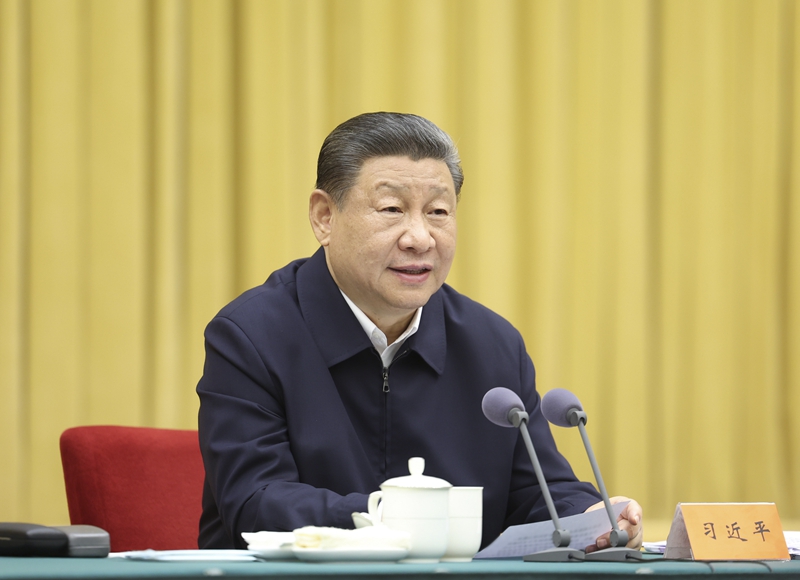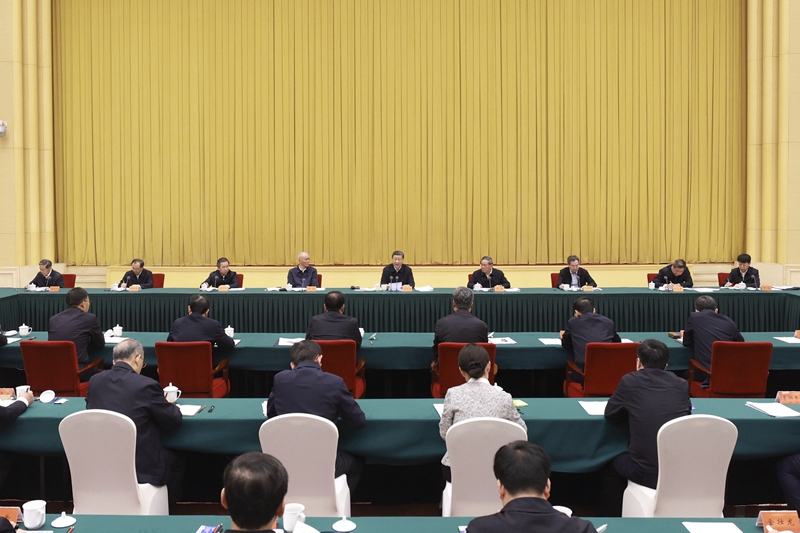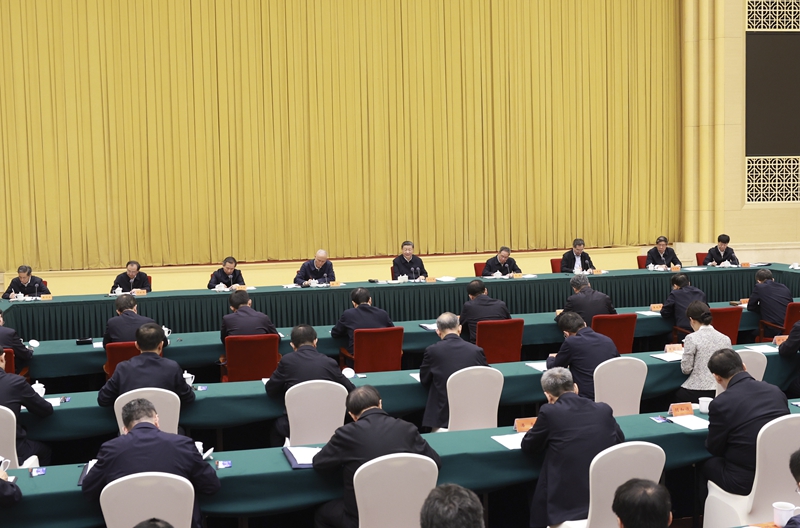Xi chairs symposium on boosting development of China's western region in new era

Chinese President Xi Jinping, also general secretary of the Communist Party of China Central Committee and chairman of the Central Military Commission, chairs a symposium on boosting the development of China's western region in the new era in southwest China's Chongqing Municipality, April 23, 2024. [Photo/Xinhua]
CHONGQING -- Chinese President Xi Jinping on Tuesday stressed further efforts to usher in a new stage in the development of China's western region featuring well-coordinated environmental conservation, greater openness and high-quality development.
Xi, also general secretary of the Communist Party of China (CPC) Central Committee and chairman of the Central Military Commission, made the remarks while chairing a symposium on boosting the development of China's western region in the new era.
At the symposium, he called for action to write a new chapter on the development of the western region.
China's western region has seen significant achievements in eco-environmental conservation and restoration over the past five years, but the region's development is still faced with difficulties and challenges, Xi pointed out.
Developing industries that leverage local strengths should be the main focus, he said, adding that efforts are needed to adopt a region-specific approach in developing emerging industries and expedite industrial transformation and upgrade in the western region.
Xi highlighted the imperative to strengthen integration between sci-tech innovation and industrial innovation, and strive for breakthroughs in a batch of core technologies in key fields.
Measures should be taken to speed up technological upgrades of traditional industries, advance equipment renewals in major industries, and sharpen the competitive edge of traditional industries, he noted.
Xi stressed fostering new quality productive forces in accordance with local conditions, exploring the development of modern manufacturing and strategic emerging industries, and mapping out plans for developing industries of the future to nurture new growth drivers for the region.
He underscored the importance of high-level ecological protection in sustaining high-quality development, and the significance of safeguarding national ecological security.
Vigorous efforts should be made to promote energy saving and carbon reduction in traditional sectors, as well as the clean and efficient usage of coal, he added.
Xi underscored boosting the development of the western region with greater openness and expanding opening up both within the country and to the outside world.
He considered it imperative to promote the construction of the new western land-sea corridor, and advance the development and openness of regions along the corridor to help them deeply integrate into the Belt and Road Initiative.
More should be done to optimize the layout of industrial parks, economic cooperation zones in border areas, and cross-border economic cooperation zones, and promote the high-quality development of pilot free trade zones, Xi said.
He said it is essential to steadily expand institutional opening up and foster a market-oriented, law-based and internationalized business environment.
Xi emphasized the necessity of coordinating development and security, and of enhancing China's ability to ensure the security of energy and other resources.
He urged efforts to boost the capacity of the west-to-east power transmission program and accelerate the formation of national exploitation and processing bases of mineral resources.
He also urged vigorously promoting the construction of the Chengdu-Chongqing economic circle.
It is necessary to promote new urbanization and comprehensive rural revitalization in a coordinated way, and to safeguard and improve people's well-being in the course of development, Xi stressed.
Xi pointed out that it is necessary to forge a strong sense of community for the Chinese nation and to effectively safeguard ethnic unity and border stability.
He called for action to help the border areas prosper and enrich local residents in the new era, strengthen the construction of infrastructure and public service facilities in border areas, and boost border tourism and other industries.
Li Qiang, premier, Cai Qi, director of the General Office of the CPC Central Committee, and Ding Xuexiang, vice premier, attended the symposium. They are all members of the Standing Committee of the Political Bureau of the CPC Central Committee.
Li said that the development of the western region should be planned and promoted during the process of Chinese modernization, and targeted measures should be taken in a region-specific and category-based manner.
He urged coordinated efforts to both defuse local government debt risks and ensure stable development, expand opening up both within the country and to the outside world, align the development of the western region to other regional development strategies, and engage the western region in the international circulation.
Ding demanded continued steps to prevent and control pollution in an accurate, scientific and law-based approach to further improve the ecology and the environment.
He also called for action to accelerate the green and low-carbon transformation of economic growth, develop new quality productive forces in a region-specific manner, and actively yet prudently work toward peaking carbon dioxide emissions and achieving carbon neutrality.

Chinese President Xi Jinping, also general secretary of the Communist Party of China Central Committee and chairman of the Central Military Commission, chairs a symposium on boosting the development of China's western region in the new era in southwest China's Chongqing Municipality, April 23, 2024. [Photo/Xinhua]

Chinese President Xi Jinping, also general secretary of the Communist Party of China Central Committee and chairman of the Central Military Commission, chairs a symposium on boosting the development of China's western region in the new era in southwest China's Chongqing Municipality, April 23, 2024. [Photo/Xinhua]



